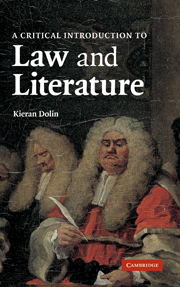Book contents
- Frontmatter
- Contents
- Preface
- Introduction to law and literature: walking the boundary with Robert Frost and the Supreme Court
- PART I EMINENT DOMAINS: THE TEXT OF THE LAW AND THE LAW OF THE TEXT
- PART II LAW AND LITERATURE IN HISTORY
- 3 Renaissance humanism and the new culture of contract
- 4 Crime and punishment in the eighteenth century
- 5 The woman question in Victorian England
- 6 The common law and the ache of modernism
- 7 Rumpole in Africa: law and literature in post-colonial society
- 8 Race and representation in contemporary America
- Conclusion
- Notes
- Bibliography
- Index
4 - Crime and punishment in the eighteenth century
Published online by Cambridge University Press: 05 June 2012
- Frontmatter
- Contents
- Preface
- Introduction to law and literature: walking the boundary with Robert Frost and the Supreme Court
- PART I EMINENT DOMAINS: THE TEXT OF THE LAW AND THE LAW OF THE TEXT
- PART II LAW AND LITERATURE IN HISTORY
- 3 Renaissance humanism and the new culture of contract
- 4 Crime and punishment in the eighteenth century
- 5 The woman question in Victorian England
- 6 The common law and the ache of modernism
- 7 Rumpole in Africa: law and literature in post-colonial society
- 8 Race and representation in contemporary America
- Conclusion
- Notes
- Bibliography
- Index
Summary
In one of the ruling ideas in eighteenth-century literary culture, poets were legislators. ‘Poets are the unacknowledged legislators of mankind’, the Romantic poet Shelley declared from exile in Italy. Although this is the most memorable formulation of the doctrine, earlier poets omitted the qualifier, and assumed their role was an acknowledged one. A century before Shelley, Alexander Pope in his Essay on Criticism argued that literature was subject to traditional rules as part of the law of Nature:
These rules of old discover'd, not devis'd,
Are Nature still, but Nature Methodiz'd;
Nature, like Liberty, is but restrain'd
By the same Laws which first herself ordain'd.
Homer was the first literary law-giver, and the writers of ancient Greece and Rome ‘Receiv'd his laws, and stood convinced ’twas fit / Who conquer'd Nature shou'd preside o'er Wit.' In Britain, Pope found only a few writers who ‘here restor'd Wit's Fundamental Laws’, thereby justifying his own satires on the culture of his day.
A generation later, Samuel Johnson distilled this trope in his novel, Rasselas: his hero Imlac states that the poet ‘must write as the interpreter of nature, and the legislator of mankind, and consider himself as presiding over the thoughts and manners of future generations’. Johnson's friend, Oliver Goldsmith, saw poets as exerting a corrective influence in their own generations but insisted that they were legislators only by analogy:
new fashions, follies, and vices make new monitors in every age necessary. An author may be considered as a merciful substitute for a legislator; he acts not by punishing crimes, but preventing them; however virtuous the present age, there may be still growing employment for ridicule, or reproof, for persuasion, or satire.
- Type
- Chapter
- Information
- A Critical Introduction to Law and Literature , pp. 96 - 119Publisher: Cambridge University PressPrint publication year: 2007



